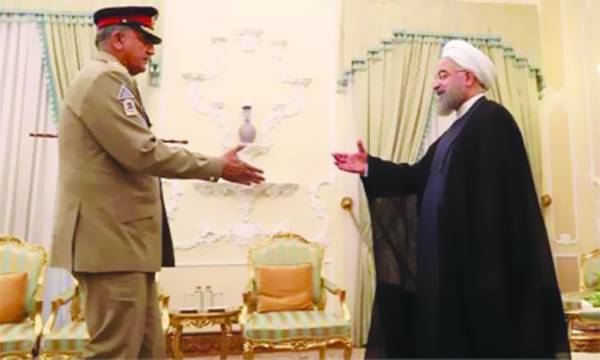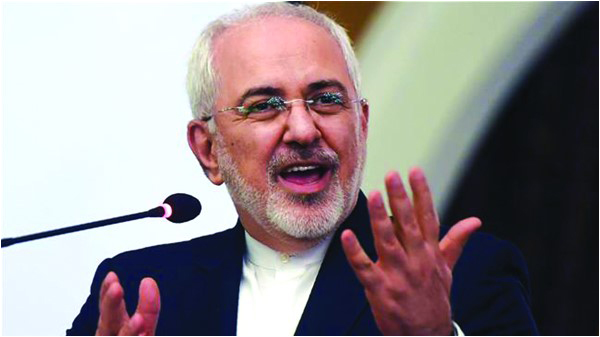
Pakistan and Iran are continuing with their high-level engagement, showing a desire on both sides to reset their ties—but they are moving forward with great caution. The process is so slow paced, however, that at times it seems not to be moving at all.
Iran’s Foreign Minister Javad Zarif visited Islamabad and Karachi earlier this week, meeting Prime Minister Shahid Khaqan Abbasi, Foreign Minister Khawaja Asif, Interior Minister Ahsan Iqbal, National Security Adviser Gen (ret’d) Nasser Janjua and Chief of Army Staff Gen Qamar Bajwa. This was Mr Zarif’s sixth visit to Islamabad in less than three years. He was probably right in saying in one of his public appearances that “we never leave Islamabad”.
That was definitely not the case a few years ago. What we can infer from the number of delegations coming from Tehran is that there is a renewed interest in engaging Pakistan. Similarly, Pakistan has revised its policy vis-à-vis Iran and is opening up to the neighbor. Several official delegations have travelled to Iran over the past couple of years. If one were to go by Defense Minister Khurram Dastagir’s words, Gen Bajwa’s Tehran visit “achieved an opening” with Iran.
That presents an encouraging prospect for the revival of an old relationship, whose 70th anniversary is being celebrated this year. But, the challenges to changing the dynamics of the bilateral ties - particularly their worldviews and geo-political alignments - are too big to allow an immediate shift.
The biggest irritant in the relationship has been border security. Iran has been levelling the accusation that terrorists based in Pakistani territory launch cross-border attacks, killing its soldiers. In the past, Pakistan has been slow to address the issue, although it was through Pakistani help that Iranians captured Jundallah leader Abdolmalek Rigi in 2010. A better way of putting it would be that there was no sustained effort to prevent cross-border attacks and last year (April 2017) alone ten Iranian border guards were killed in an attack claimed by Jaish-ul-Adl.
But, now the Iranians are happy. The two sides have taken steps agreed upon during Gen Bajwa’s visit to Tehran, which include fencing, setting up additional outposts, and deploying paramilitary troops. Mr Zarif, during his meeting with Gen Bajwa, expressed his satisfaction that the arrangement was working.
He disclosed during a TV interview that this week two suicide attempts from Pakistani territory into Iran were foiled through “excellent cooperation” from Pakistani forces. So that’s it. A major issue stands addressed—at least for the time being—and it can pave the way for further cooperation.

Then comes the divergence in worldviews. Pakistan is deeply committed to Saudi Arabia. To quote Mr Dastgir again, Pakistan has “ideological affinity besides a deep military and economic relationship as well as strong leadership ties with the Kingdom”. Recently, the military announced deployment of a contingent in the Kingdom.
Iranians publicly don’t make much fuss about our ties with KSA. They did not react to Gen Raheel Sharif joining the Saudi-led coalition and so did they prefer silence over the announcement of troop deployment. But, that does not mean that they are not concerned.
“We need to move away from bloc formation. We need to move away from attempting to achieve hegemony,” Mr Zarif said while speaking at a seminar in Islamabad, where he also warned that security cannot be bought. The message was very clear. It was addressed primarily to Riyadh and Cc’d to Islamabad.
Similarly, Pakistanis have concerns about Iran’s ties with India, more specifically the latter’s participation in the Chahbahar Seaport project. In a way, Mr Zarif equated both issues, if one were to interpret it that way. “Our relations with India, just like Pakistan’s relations with Saudi Arabia, are not against Pakistan as we understand Pakistan’s relations with Saudi Arabia are not against Iran,” he said at a seminar.
Both Pakistan and Iran are living with these realities and will continue to do so. This would hopefully provide a context for a better understanding of a statement from the National Security Adviser’s office after a meeting between Mr Zarif and Gen (ret’d) Janjua, which said: “Common threats and opportunities were identified and both sides reiterated to work in a cooperative framework to seek lasting peace in the region while catering for the sensitivities of each other.”
The problem, however, comes when the elements that could provide a sustainable basis for taking the ties forward are not put in place. These include: the Iran-Pakistan gas pipeline, electricity import by Pakistan, establishment of banking ties, reaching a free trade agreement, and removing non-trade barriers. Trade would create positive stakes for both countries. There is an agreement on taking the trade to $5 billion a year and a commitment by Iran to provide for Pakistan’s energy security.
The trust deficit emerging from a divergence on geo-politics is holding both countries back from reaching those targets and promises, even though sanctions are used as a convenient cover to delay progress on these issues. For instance, an agreement for banking ties was signed between the State Bank of Pakistan and Iran’s central bank last year, but it still has to take shape. Without banking ties, an increase in trade is not possible.
PM Abbasi could not have made a truer statement, when he told Zarif that “the two sides should work together in all earnest”.
The writer is a freelance journalist based in Islamabad. mamoonarubab@gmail.com @bokhari_mr
Iran’s Foreign Minister Javad Zarif visited Islamabad and Karachi earlier this week, meeting Prime Minister Shahid Khaqan Abbasi, Foreign Minister Khawaja Asif, Interior Minister Ahsan Iqbal, National Security Adviser Gen (ret’d) Nasser Janjua and Chief of Army Staff Gen Qamar Bajwa. This was Mr Zarif’s sixth visit to Islamabad in less than three years. He was probably right in saying in one of his public appearances that “we never leave Islamabad”.
That was definitely not the case a few years ago. What we can infer from the number of delegations coming from Tehran is that there is a renewed interest in engaging Pakistan. Similarly, Pakistan has revised its policy vis-à-vis Iran and is opening up to the neighbor. Several official delegations have travelled to Iran over the past couple of years. If one were to go by Defense Minister Khurram Dastagir’s words, Gen Bajwa’s Tehran visit “achieved an opening” with Iran.
But, now the Iranians are happy. The two sides have taken steps agreed upon during Gen Bajwa's visit to Tehran, which include fencing, setting up additional outposts, and deploying paramilitary troops
That presents an encouraging prospect for the revival of an old relationship, whose 70th anniversary is being celebrated this year. But, the challenges to changing the dynamics of the bilateral ties - particularly their worldviews and geo-political alignments - are too big to allow an immediate shift.
The biggest irritant in the relationship has been border security. Iran has been levelling the accusation that terrorists based in Pakistani territory launch cross-border attacks, killing its soldiers. In the past, Pakistan has been slow to address the issue, although it was through Pakistani help that Iranians captured Jundallah leader Abdolmalek Rigi in 2010. A better way of putting it would be that there was no sustained effort to prevent cross-border attacks and last year (April 2017) alone ten Iranian border guards were killed in an attack claimed by Jaish-ul-Adl.
But, now the Iranians are happy. The two sides have taken steps agreed upon during Gen Bajwa’s visit to Tehran, which include fencing, setting up additional outposts, and deploying paramilitary troops. Mr Zarif, during his meeting with Gen Bajwa, expressed his satisfaction that the arrangement was working.
He disclosed during a TV interview that this week two suicide attempts from Pakistani territory into Iran were foiled through “excellent cooperation” from Pakistani forces. So that’s it. A major issue stands addressed—at least for the time being—and it can pave the way for further cooperation.

Then comes the divergence in worldviews. Pakistan is deeply committed to Saudi Arabia. To quote Mr Dastgir again, Pakistan has “ideological affinity besides a deep military and economic relationship as well as strong leadership ties with the Kingdom”. Recently, the military announced deployment of a contingent in the Kingdom.
Iranians publicly don’t make much fuss about our ties with KSA. They did not react to Gen Raheel Sharif joining the Saudi-led coalition and so did they prefer silence over the announcement of troop deployment. But, that does not mean that they are not concerned.
“We need to move away from bloc formation. We need to move away from attempting to achieve hegemony,” Mr Zarif said while speaking at a seminar in Islamabad, where he also warned that security cannot be bought. The message was very clear. It was addressed primarily to Riyadh and Cc’d to Islamabad.
Similarly, Pakistanis have concerns about Iran’s ties with India, more specifically the latter’s participation in the Chahbahar Seaport project. In a way, Mr Zarif equated both issues, if one were to interpret it that way. “Our relations with India, just like Pakistan’s relations with Saudi Arabia, are not against Pakistan as we understand Pakistan’s relations with Saudi Arabia are not against Iran,” he said at a seminar.
Both Pakistan and Iran are living with these realities and will continue to do so. This would hopefully provide a context for a better understanding of a statement from the National Security Adviser’s office after a meeting between Mr Zarif and Gen (ret’d) Janjua, which said: “Common threats and opportunities were identified and both sides reiterated to work in a cooperative framework to seek lasting peace in the region while catering for the sensitivities of each other.”
The problem, however, comes when the elements that could provide a sustainable basis for taking the ties forward are not put in place. These include: the Iran-Pakistan gas pipeline, electricity import by Pakistan, establishment of banking ties, reaching a free trade agreement, and removing non-trade barriers. Trade would create positive stakes for both countries. There is an agreement on taking the trade to $5 billion a year and a commitment by Iran to provide for Pakistan’s energy security.
The trust deficit emerging from a divergence on geo-politics is holding both countries back from reaching those targets and promises, even though sanctions are used as a convenient cover to delay progress on these issues. For instance, an agreement for banking ties was signed between the State Bank of Pakistan and Iran’s central bank last year, but it still has to take shape. Without banking ties, an increase in trade is not possible.
PM Abbasi could not have made a truer statement, when he told Zarif that “the two sides should work together in all earnest”.
The writer is a freelance journalist based in Islamabad. mamoonarubab@gmail.com @bokhari_mr

